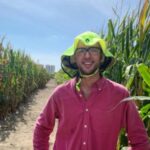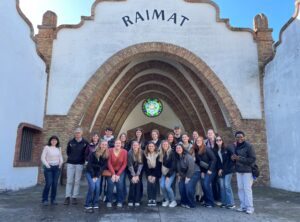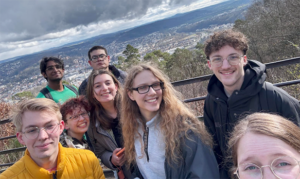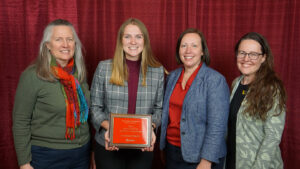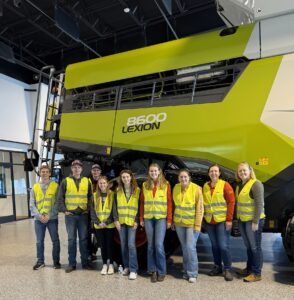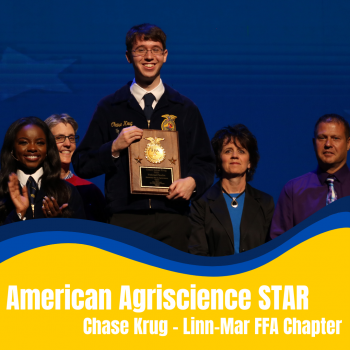
Agronomy senior Chase Krug won the National FFA Star in Agriscience at the national convention in Indianapolis last week. Each year at the National FFA Convention & Expo, four FFA members are honored with American Star Awards for outstanding accomplishments in FFA and agricultural education.
The American Star Awards, including American Star Farmer, American Star in Agribusiness, American Star in Agricultural Placement and American Star in Agriscience, are presented to FFA members who demonstrate outstanding agricultural skills and competencies through completion of an SAE. A required activity in FFA, an SAE allows students to learn by doing, by either owning or operating an agricultural business, working or serving an internship at an agriculture-based business, or conducting an agriculture-based scientific experiment and reporting results.Other requirements to achieve the award include demonstrating top management skills; completing key agricultural education, scholastic and leadership requirements; and earning an American FFA Degree, the organization’s highest level of student accomplishment.
An ag science course in Chase Krug’s freshman year of high school introduced him to FFA and led him down a path of agricultural research. He now has over a dozen research projects and an international research experience under his belt.
“I’m originally from a suburban background, so I’ve never had formal experience in agriculture through my family,” he said.Krug, from Linn-Mar FFA in Iowa, says while his research has varied, he’s focused primarily on plant science and plant breeding.
One of his favorite agriscience experiences took place on the other side of the world.
“I was able to be an intern at the World Vegetable Center in Hyderabad, India,” he said. “I lived in India for a summer and got to do international research with great professionals from around the world.”
The research Krug did in India concerned bruchid beetles, which eat mung beans in storage. He looked at what biomolecules in mung beans prevent bruchid beetles from eating them.
“That was a really great experience, and it really shows the impact of taking your research and having an applied component that helps someone instead of doing research just to fill our gap of knowledge — it also contributes to the betterment of society directly,” he said.
Through his other research experiences, Krug has studied soybean drought tolerance, potatoes bred to resist Colorado potato beetles, the idea of cultivating Andean tuber crops in Lesotho and more. Reflecting on his FFA career, he said learning how to do research in his ag classes and developing his leadership skills through FFA helped prepare him for a career in scientific research. Right now, Krug is a student at Iowa State University, studying philosophy and agronomy. He plans to earn a Ph.D. in plant breeding and focus his work on public gardens.
“That avenue is what I’m looking toward to really impact both my interest in helping the public and educating the public about science and also conducting research to help either farmers, gardeners, or the industry really move forward and become more sustainable,” he said. “I hope one day that I actually create a public garden research institution somewhere in Iowa.”

